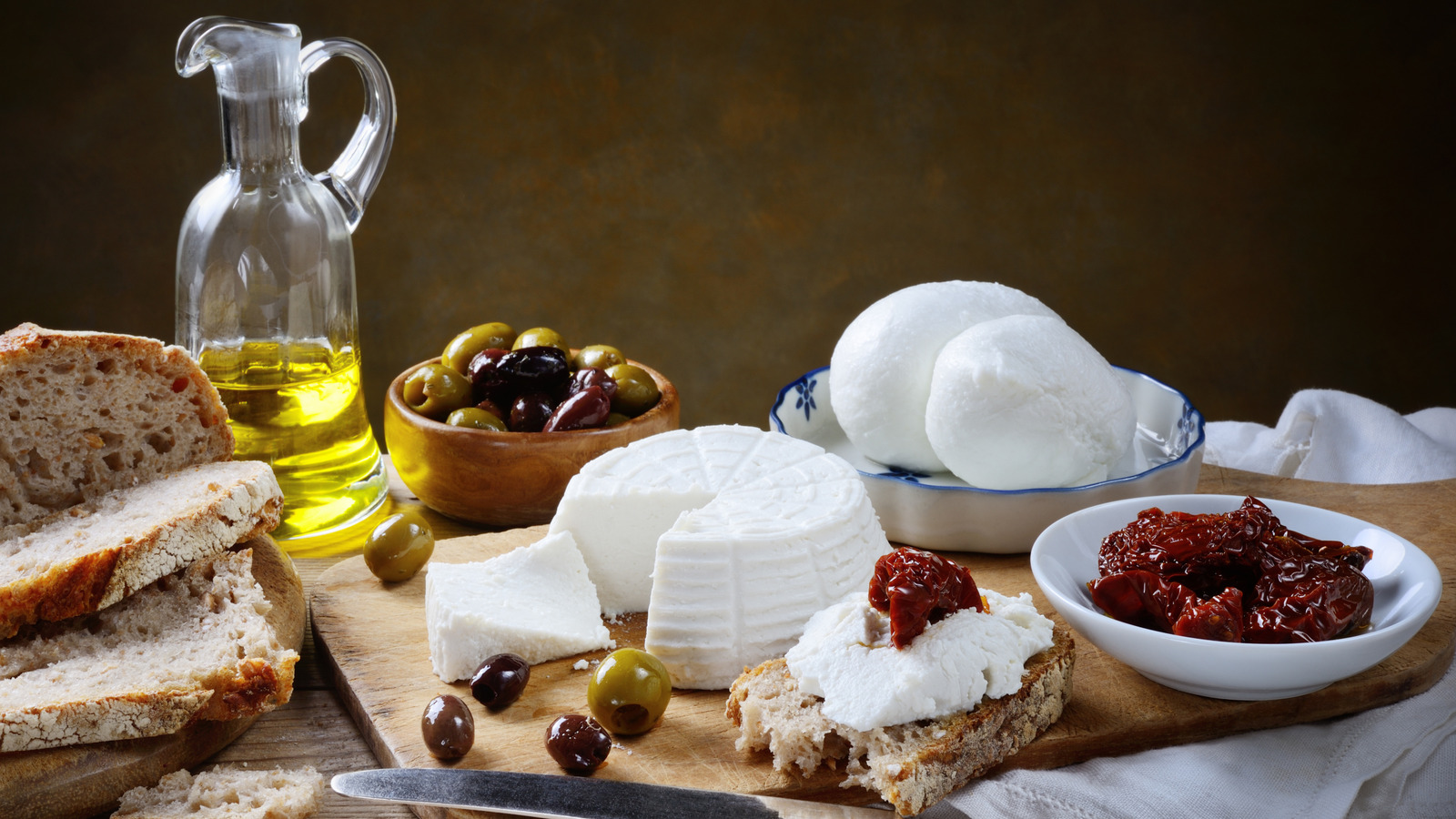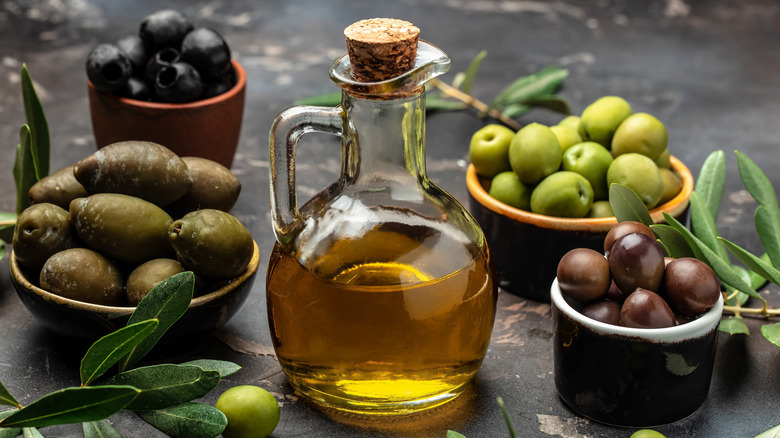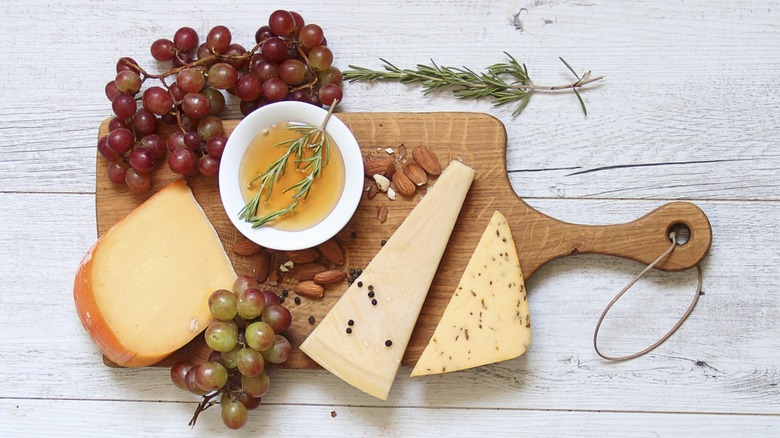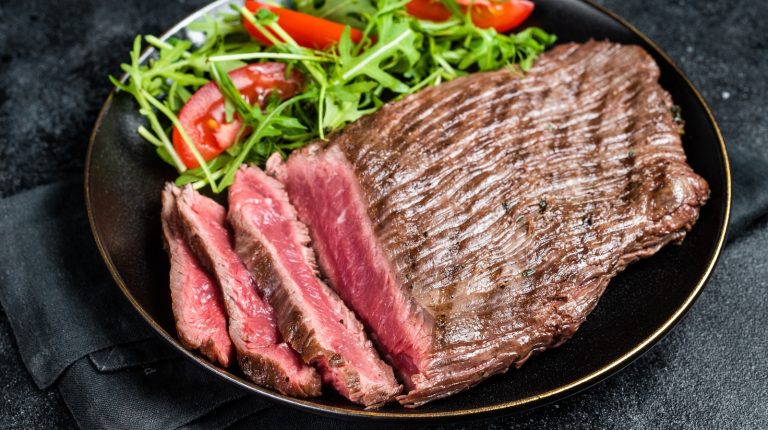No picnic, dinner party, or wine tasting is complete without a cheese board to congregate around. We have composed a list of tips for putting together the ultimate cheese board that include choosing cheeses, and the best garnishes, sauces, and drinks to pair them with. Fruit, jams, nuts, and charcuterie are par for the course, but we consulted an expert to think outside of the box. And who better to talk to about unique cheese board ideas than Dominick DiBartolomeo, owner of The Cheese Store of Beverly Hills? DiBartolomeo makes a convincing argument for why olive oil deserves a spot on your cheese board.
“Olive oil enhances the flavor of the cheese by adding richness and smoothness, can act as a finishing touch to bring out the cheese’s nuances, and can even be used to marinate certain cheeses beforehand, infusing them with additional flavor.” Just as you’d finish a white cheesy artichoke and spinach pizza with a drizzle of olive oil or use olive oil and herbs to marinate a block of feta, you can accompany an assortment of fresh and aged cheeses with olive oil.
DiBartolomeo says, “Olive oil can enhance the flavor of cheese by adding a smooth, savory element, often bringing out the cheese’s natural sweetness and complexity.” Read on for more advice on types of olive oil and specific cheese pairings.
What’s the best olive oil for your cheese board?
Olive oil encompasses various flavor profiles, which Dominick DiBartolomeo categorizes as “fruity, peppery, or nutty.” All three of these elements have a place on your cheese board. Our guide for finding the best olive oil will help you decipher quality through visual, olfactory, and labeling cues. Spicier, bitter olive oils tend to be recently pressed, but the type of olive used and the producing country also play big roles in taste.
According to DiBartolomeo, intensity and flavor are the two factors to consider when choosing the best olive oil for your cheese board. “I think you have to pair like with like. If you have a milder cheese, you will want a low acid, buttery oil that will not overpower the cheese. The same is true for a really spicy olive oil. You need a cheese that can stand up to it.” Matching the intensity of flavors between olive oils and types of cheese is a good rule of thumb.
“When thinking about pairings, I really like complementary flavors that are balanced to show the true expression of the flavors.” Complementary flavors tend to be opposing flavors that mutually benefit from a pairing; think sweet and savory, or sweet and spicy, but with olive oils and cheeses DiBartolomeo’s suggestions imply that you don’t want to overpower a mild cheese with a too-peppery olive oil, for example. Our ranking of different olive oils for dipping bread offers brands that range from fruity and smooth Tourangelle’s EVOO to peppery and herbal Kosterina Original EVOO.
Olive oil and cheese pairings
When it comes to more specific olive oil and cheese pairings, Dominick DiBartolomeo told us, “generally, milder cheeses pair well with lighter olive oils, while stronger cheeses can handle more robust olive oils with peppery notes.” You might find you prefer to drizzle oil onto creamy, buttery cheeses with mild flavors. Absorbent or crumbly cheeses work well with olive oil marinades. For hard, more pungent cheeses, you could just dip them in oil before you nibble. If you marinate them in oil, they will soften, which may suit your preference, too.
You can find a specific bottle of olive oil to complement any type of cheese, no matter how obscure. DiBartolomeo says, “I think most cheeses can pair really well with olive oils.” He suggests pairing fresh cheeses like burrata, fresh chevres, and young pecorinos with milder olive oils. For sharper cheeses like aged Parmigiano Reggiano or aged Alpine Swiss cheeses, he says, “You will need a robust, spicy, acidic oil.”
You could also pair regional cheeses with corresponding regional olive oils. For example, a hard Spanish manchego would work well with a peppery, earthy Sevillan extra virgin olive oil like this premium Flor de la Jara oil available on Amazon. You can marinate a Greek feta in a Greek olive oil like this Mr. Papou’s from a family farm. At the same time, you can bring more flavors to both the cheese and the olive oil with the addition of fresh herbs, citrus zest, aromatics, or diced chilies. Follow our guide on how to infuse olive oil for the tastiest result.






